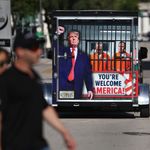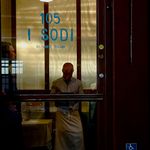
They left their homes in Venezuela, trekked through a 60-mile-wide strip of rainforest between Colombia and Panama, made their way through Central America and Mexico — in some instances by clinging to the top of a freight train known as La Bestia (“the Beast”) for over a thousand miles — and then waited in Mexican border cities until they could cross into the United States. Once there, they turned themselves in to immigration authorities and spent days or weeks in detention. After months on the move, they finally arrived in New York City, carrying little but their cell phones and the clothes on their backs.
Now, they’re among the 75 or so asylum seekers living in a vacant midtown office building across from the Moynihan Train Hall. Until recently, some of them had been staying in a Coney Island public-school gym, but after intense backlash from students’ parents and local officials, the city transferred them to this “respite center,” one of six recently opened for short-term stays. On a Monday afternoon, dozens of people sat outside the former Touro College building trying to figure out their next move. None of them knew how long they would be able to stay there or whether the city would find someplace else for them. Six men and women spoke with Curbed about their journey across the border and their life in New York so far.
Leonardo, 27, from Venezuela
I had thought about going to Florida, but because of what’s happening down there with the governor, my friend there who I was going to stay with no longer lives there. He had to leave the state — he went to Washington.
I’ve been here three days. Things are good because we have a roof over our heads, and they give us food. But we don’t have a bathroom, nowhere to shower. Today, I had to wash myself with water from the sink. We haven’t been given any information on how long we’ll be here. We’re just waiting to see if we’ll be sent to a better place where we’ll be able to shower.
I went out yesterday to look for work. I went to one place near the train station and was told to come back later when the boss was there; then when I came back, he wasn’t hiring.
Rosalba, 32, and her husband, Daniel, 31, from Venezuela
Daniel: We spent six days going through the jungle between Colombia and Panama. It was terrible. This was during the winter, and it was raining the whole time. Then we got to Panama, then Costa Rica, where we stayed for four months waiting to get enough money together so we could keep going. Then we went to Nicaragua. We walked a lot. We ran out of money in Honduras, but a lot of people helped us. We did odd jobs. When we got to Guatemala, people robbed us and the police took money from us. It was extortion. They’d get on a bus and say, “Okay, $10 a head.”
We got to the Mexican border on May 10, a day before Title 42 ended. We got there at 11 a.m., changed our clothes, and crossed through the river into the U.S.
Right before we crossed, my cousin in Orlando who was going to host us told me to rethink going there because the situation is really difficult because of the governor. She said they were thinking of leaving too. So I figured, Are we going to start from zero with someone who’s starting over too? Going there is too difficult. We spent a week in Texas and then we came here because we heard this is a place where they help immigrants. We came here to try our luck, and now we’re waiting, and God willing, something good will happen.
Rosalba: What we’re trying to figure out now is how to find work. We just got here, and we don’t have our work permits yet.
Daniel: We’ve been here five days, and I’m starting to feel desperate. They treat us well here, and everything is clean, but we’re being told there’s no hotels — they’re all full. Here, it’s about 20 cots to a room. You know the cots they use in war? Like those. There’s a lot of people, mostly single men. We were staying on the third floor, but they moved us up to the fourth floor.
Rosalba: There’s nowhere to shower, that’s the thing. We’ve just been using the sinks to bathe.
Daniel: Every day, we walk around looking for work.
Rosalba: But we don’t speak English. Everywhere we’ve asked for work, they say we need proof of residency, IDs. Obviously, we don’t have those things right now because we don’t have permanent addresses. We need some form of stability so we can start working so we can fill out our paperwork.
Daniel: We don’t even have clothes. When you cross the border, they take all your things.
Rosalba: Here, they’re helping us out with the basics, what you need in the moment: toothbrushes, personal-hygiene products. But we don’t have clothes. We’ve spent days with the same clothes on. And it affects us when we look for work, too.
Daniel: We need to look presentable.
Rosalba: And we don’t look presentable right now because we don’t have anything. And since we don’t have jobs, we can’t buy ourselves clothing, either.
Daniel: But everything is going to work out in the end.
Jan, 24, from Venezuela
I applied for asylum about two months ago on my way here. I was in El Paso for a while, and I had to stay there for a bit because I didn’t have enough money to keep going. It took me a little over a month to get here. I was supposed to go to Boston — I missed my bus transfer in New York. But I met someone at the bus station — the first person I met when I got off my bus — who told me they’d be able to help me find work. I decided, this is God telling me to stay here.
I’ve been here five days. Usually, I wake up around six or seven in the morning. I brush my teeth and get dressed, then I go out and look for work. I haven’t been able to find any because they said I need to get my papers in order first. I left here today at 5 a.m. I was out looking for work in Corona, Queens. Out there, they say there’s more work.
We’ve come up with little ways to get some income. To come up with the money for train fare, we’ve been selling cigarettes.
I’ve looked at restaurants, stores, everywhere. They all say I need to have my papers before I can work. I’m going to keep looking. Something will come up.
Jonathan, 27, and Leudel, 46, from Venezuela
Jonathan: I was really far away before, on Staten Island. We were sleeping on a basketball court. But then they brought us here. It’s more comfortable here. Well, it was good there, too, because I had gotten to know more people there and we could socialize, play basketball and other sports. In a way, I liked it more there, but it’s better here because it’s more central. Men and women stay in separate rooms, and I think the families are kept somewhere else.
Leudel: It’s easier to look for work here, but there isn’t any. I’ve been looking all day since this morning. I walked all up and down this street. I’ve gotten lost, but I always know to come back here: 31st Street.
It’s comfortable. The only thing is the food isn’t very good. We just get bread and juice and some water. For breakfast, we get these little cakes, jam, milk. It’s not great, but we still have to thank God because it’s something.
We both crossed through the Darién Gap, and there we went hungry, the kids went hungry. On the way over, we saw a lot of people die — kids, pregnant people. The two of us didn’t come here together, but it was the same disgraceful experience for us both, the same madness. It’s the worst thing there is.
Jonathan: In Darién, I went four days without eating a thing. I was just drinking water.
Leudel: I spent 17 days there, and I came out on the 18th day. I came with my siblings and their kids. It was a group of eight of us, plus three kids. We took turns carrying them on our backs.
Jonathan: I crossed with a family I met in Necoclí, Colombia. I hadn’t heard from them in a few days, and people were talking about how there had been an accident. It turns out one of the people I was worried about in that family had died in the accident. His mom is here. Yesterday, I met up with his sister and his sister-in-law; they live here too. We had heard about how dangerous it was, but it’s something else to live it. You know, you think people exaggerate, but it wasn’t easy.
This here? This is calm. Now I’m chubby again.
Leudel: It feels good to be here. People passing by, people who speak Spanish, have been helping us out a lot. Like, “Hey, here’s $5, go buy some pizza for the kids.” So the kids are eating well now. Someone gave us money so we could get diapers and stuff for the kids. People we don’t even know. They’ve been good to us, thank God.
But we haven’t been able to get work. I was told I need to find my birth certificate, my ID document, my immigration papers. But I don’t have those things. I can’t go look for them because they all got washed away in the river. People don’t know how much we suffered to get here. We went hungry, we got sick, we saw so many people die. The only ones who know are God and those of us who saw it.
These conversations have been condensed and edited for clarity.


